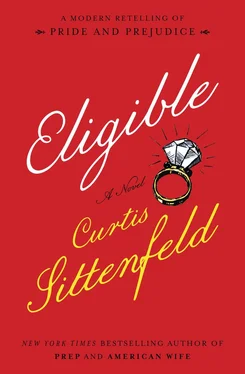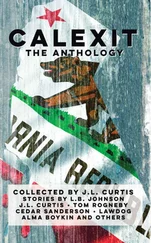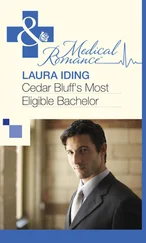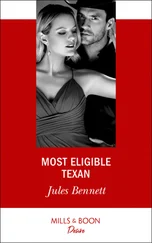The next time she and Jasper met after the five-year hiatus, it was for drinks, and after the third round, Jasper said that he and Susan had together reached the painful conclusion that their marriage had run its course and that while both of them had had the best of intentions, they agreed they’d made a mistake choosing each other. The catch was that if Susan or any of her siblings divorced, Susan’s deeply Catholic grandmother, a rich, spiteful, and surprisingly hale ninety-eight-year-old living on the Upper East Side, would cut them out of her will, and Aidan wouldn’t get to attend private school. Thus, although Jasper and Susan had each other’s blessings to pursue extramarital relationships, they would continue to live together until Susan’s grandmother died. After conveying this information, Jasper swallowed, and there were tears in his brown eyes as he said, “It was always you, Nin. I messed up so badly, but it was always you.”
At points during their five-year silence, Liz had indulged in the fantasy that Jasper would show up at her office or apartment — possibly, as in a movie, having run through the rain — to urgently declare his love. He might even, in such scenarios, have said, It was always you. But he would not have still been legally wed to Susan; certainly, he would not be the father of a nineteen-month-old. And yet, through the shimmery softness of the three gins she’d consumed, Liz thought that these compromising circumstances gave the situation a certain credibility: It wasn’t too good to be true. She didn’t need to feel unsettled by getting everything she’d always hoped for.
Back at her apartment, the consummation of their whatever-it-was also was not a dream come true — certainly fourteen years of buildup and more than a half dozen cocktails between them didn’t help matters — but it was adequate, and afterward, when Jasper fell asleep holding her, she wished that her twenty-two-year-old self could know that it would, in the end, happen for them. Her twenty-two-year-old self might have been less charmed when Jasper woke up forty minutes later, took a hasty shower, and hurried home to his wife and child; despite Jasper and Susan’s conjugal agreement, it was Jasper’s turn the next morning to get up with Aidan at five A.M.
Within a week, Jasper had made three more visits to Liz’s apartment and in two cases slept over; patterns had been established. The drawbacks to this version of a relationship were so glaringly obvious — because members of Susan’s extended family loyal to her grandmother lived in Manhattan, discretion was necessary, and Liz and Jasper therefore didn’t dine together in restaurants, nor were they each other’s dates for work-related functions — that they hardly seemed worth dwelling on. On the other hand, she was able to enjoy genuine closeness, as well as physical intimacy, with someone she knew well and cared for deeply, while still having time to work and run and read and see friends — perhaps, in fact, more time than when she’d been scouring dating websites or spending three hours at a stretch analyzing her singleness with Jane or other women. A few friends knew about Jasper, as did her older sister, and their skeptical reactions were for Liz sufficient deterrent to discuss the unusual arrangement further; it was too easy for it to sound like Jasper was doing nothing more than cheating.
One Friday evening in late May, two years into Liz’s reconciliation with Jasper, Liz was at Jane’s apartment; Jane chopped kale for a salad while Liz opened the bottle of red wine she’d brought. “Are you really making me drink alone again?” Liz said.
“I’m fostering a hospitable uterine environment,” Jane replied.
“Meaning, yes, I’m on my own.”
“Sorry.” Jane frowned.
“Don’t apologize.” Liz pulled a glass from Jane’s shelf. “And any fetus would be lucky to inhabit your womb. I bet you have the Ritz of uteruses. Uteri?” Liz held her filled glass aloft. “To Latinate nouns and to reproduction.” Jane tapped her water glass against Liz’s as Liz added, “Remember Sandra at my office who took three years to get pregnant? She said she went to this acupuncturist who—” In her pocket, Liz’s phone buzzed, and she wondered if it was Jasper; apparently, Jane wondered the same thing because she said, with not entirely concealed disapproval, “Is that him?”
But it wasn’t; it was their sister Kitty. Liz held up the phone so Jane could see the screen before saying, “Hey, Kitty. I’m here with Jane.”
“It’s Dad,” Kitty said, and she was clearly crying. “He’s in the hospital.”
HALF AN HOUR after complaining to Mrs. Bennet of heartburn that he attributed to the veal cacciatore she’d made for dinner, Mr. Bennet had climbed the staircase from the entry hall on the first floor of the Tudor to the second floor and collapsed, gasping for breath. Lydia had heard him fall, Mary had called 911, and he’d been transported by ambulance to Christ Hospital.
Upon receiving Kitty’s phone call at Jane’s apartment, Liz had immediately begun trying to find flights while Jane put away the food; as it turned out, the evening’s final flights to Cincinnati out of both LaGuardia and JFK had already departed. With reservations for the early morning, Liz returned to her apartment, tossed clothes into a suitcase, slept fitfully for a couple hours, and met Jane again beyond LaGuardia’s Terminal D security checkpoint at six A.M. By then, their father was out of a six-hour surgery, intubated, and unconscious in the intensive care unit.
Though he was awake and his breathing tube had been removed when Liz and Jane arrived at the hospital straight from the airport, he was alarmingly subdued and appeared much smaller in his hospital gown than in his usual uniform of khakis, dress shirt, and navy blazer. At the sight of him, Liz bit back tears, while Jane wept openly. “My dear Jane—” Mr. Bennet said, but he spoke no more; he offered no drollery to reassure them. The many wires monitoring his vital signs beeped indifferently.
He remained in the hospital for a week. But on his second day after surgery, he’d moved from intensive care to the step-down unit, and his health had improved consistently. In increments that were less steadily apparent than manifest in sudden moments, his coloring brightened, his energy increased, his mordant humor returned, and it seemed then that he really would be all right.
In the meantime, the eldest Bennet sisters fell quickly into certain patterns. They slept in twin beds in the third-floor room that, when they were growing up, had belonged to Liz. She’d set the alarm on her cellphone for seven o’clock, and they’d rise and run together before the day grew too hot: around the curve of Grandin Road, past the bulge of the Cincinnati Country Club, right on Madison Road and again on Observatory, then up the long incline of Edwards Road’s first hill, which was gently graded but endless, and its second hill, which was short and steep. Back at home, they’d eat cereal, take turns showering, then determine what needed to be accomplished that day.
Originally overshadowed by their father’s ill health, but asserting itself with increasing insistence as Mr. Bennet improved, was the sisters’ realization that the Tudor, built in 1903, was in a state of profound disrepair. For the last twenty years, Liz and Jane had made three-day visits home, usually around the holidays, and Liz realized in retrospect that her mother had likely spent weeks preparing for their arrival. This time, when Mrs. Bennet hadn’t prepared at all, mail lay in stacks on the marble table in the entry hall; mold grew in the basin of the third-floor toilet; spiderwebs clung to light fixtures and the corners of ceilings; and Jane and Liz were sharing a room because the bed and most of the floor in the adjacent room that had once belonged to Jane were blocked by an assortment of boxes, some empty save for bubble wrap but some as yet unopened, addressed by various high-end retailers to Mrs. Frederick M. Bennet. The day before her father had been discharged from the hospital, Liz had used the blade of a scissors to open three packages, which contained, respectively, a plush cream-colored throw pillow overlaid by an embroidered pineapple; a set of royal blue bath towels featuring Mrs. Bennet’s monogram; and twelve dessert plates with Yorkshire terriers on them (the Bennets had never owned a Yorkshire terrier — or, for that matter, any other breed of dog).
Читать дальше
Конец ознакомительного отрывка
Купить книгу












